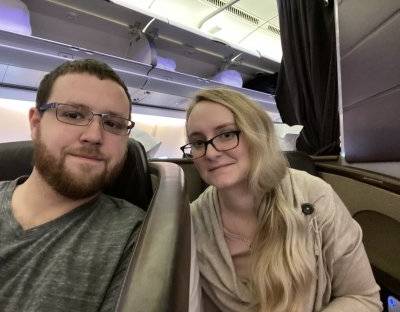Justin Wilson '13 launched his career with Delta Air Lines in 2014 and hasn't looked back.
As a finance major at Michigan Tech, Wilson learned about an opportunity to join the aviation field as a commercial strategy analyst through on-campus networking. By 2015, he was managing seat availability for all Michigan airports and heading up inventory management in the larger Austin/San Antonio market after just a year on the job. After finding his niche as a senior analyst in domestic pricing, Wilson spent the next six years on a leadership track, earning a nomination for a year-long development program that he completed in late 2020.
Like many professionals, Wilson shifted gears and priorities during the pandemic, leaving Delta briefly in 2021 to return home to Standish, Michigan, with his wife, Shaina. But the pause didn't last long. Within six months, Wilson was in a hybrid job arrangement, working again in the field he's passionate about.
Wilson manages data sets of immense size and scale. How big? 15 million published fares containing 50 columns and seven days of active history results in 5.25 billion cells of information—not including an archive that runs nearly a decade deep.
Managing such data sets requires proficiency in programming languages SAS, SQL, and Python, which Wilson uses to sift through Oracle Database, a database management system. That's not to mention data visualization, which is critical to communicating information to diverse audiences. For that, Wilson uses resources such as Tableau.
"I developed a script to automate sending regional performance metrics to individual stakeholders multiple times per day, customized based on the needs of each tier of leadership," Wilson explains. This technical prowess, while not a requirement, has given Wilson a career advantage and the ability to improve workflow and efficiency for his team. It also allows him to work remotely three days per week—he flies to Atlanta to be in office for the other two.
If you're wondering what a typical day looks like for Wilson, take a peek through his window:
8 a.m.—Review automated reporting, looking for large competitor actions.
8:30 a.m.—Run custom SQL queries to investigate competitor actions and take notes.
9:30 a.m.—Take competitive action, adjust strategy, and communicate changes to leadership before 10 a.m.
10 a.m., 1 p.m., and 4 p.m. Repeat the above cycle, with ad hoc training and meetings as needed.
This super-structured world may not be for everyone, but Wilson finds value in the work he does, knowing that his business decisions directly impact industry pricing competitiveness for the entire North American market. As a travel enthusiast himself, Wilson knows that creating positive financial outcomes permits the industry to grow and serve more passengers than ever before. This in turn creates opportunities for more people to visit the destinations they desire.
Wilson credits his education in the Michigan Tech College of Business (COB) for his dynamic skill set. "Dean Johnson (finance professor and dean of COB) did a really great job of posing questions that spark curiosity," he says. "He taught us the value of always asking: 'Why!?'"
Numbers aren't everything for Wilson, however. He spends his downtime working on his 1988 Mustang drag car, cooking Texas-style barbecue, and traveling to Europe. And in January 2023, he and Shaina, a registered nurse, welcomed a baby boy, Zander.
If Wilson's trajectory holds, his aim is to earn a senior management role at Delta within the next five years. A side goal is to convince his superiors to recruit at Tech annually. "I've met many Tech grads while working at Delta, and they're all building successful careers here," he says.
His advice to current and future Huskies is simple: "Stay open-minded. Travel early and often! Share travel stories with family, friends, and acquaintances, always seeking the next opportunity to broaden your perspective and your understanding of the world."
Tomorrow Needs Leading-Edge Analytics Professionals
Big data is here to stay. In Tech's BS in Business Analytics program, students learn to use mathematics and statistics to lead data-driven decision-making, leverage data- mining tools to answer critical business questions, and build predictive models to grow revenue and optimize retention.
The interdisciplinary Bachelor of Science program is shared between the College of Business and the Department of Mathematical Sciences. Students benefit from a flexible curriculum that allows them to choose electives in business and mathematics to customize the degree for their chosen career path.
13%
300K
$98K
Michigan Technological University is an R1 public research university founded in 1885 in Houghton, and is home to nearly 7,500 students from more than 60 countries around the world. Consistently ranked among the best universities in the country for return on investment, Michigan's flagship technological university offers more than 185 undergraduate and graduate degree programs in science and technology, engineering, computing, forestry, business, health professions, humanities, mathematics, social sciences, and the arts. The rural campus is situated just miles from Lake Superior in Michigan's Upper Peninsula, offering year-round opportunities for outdoor adventure.





